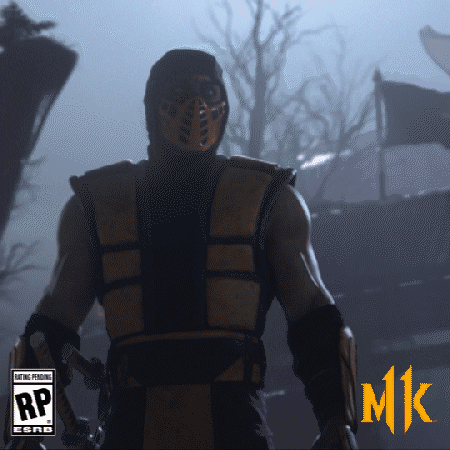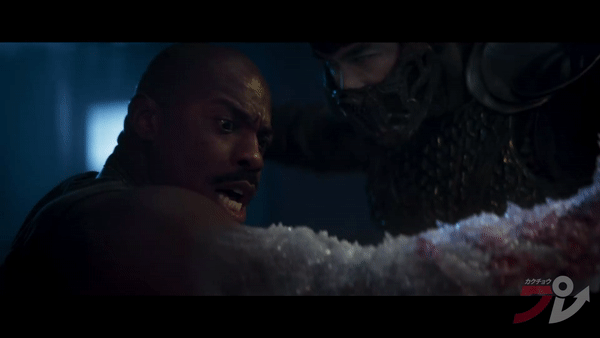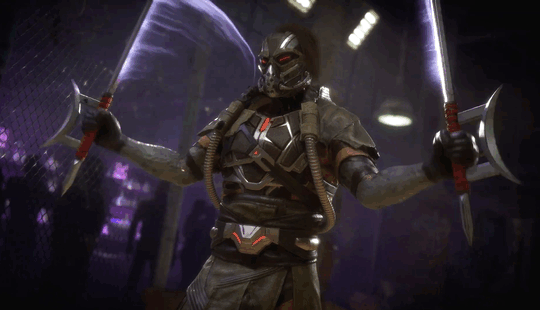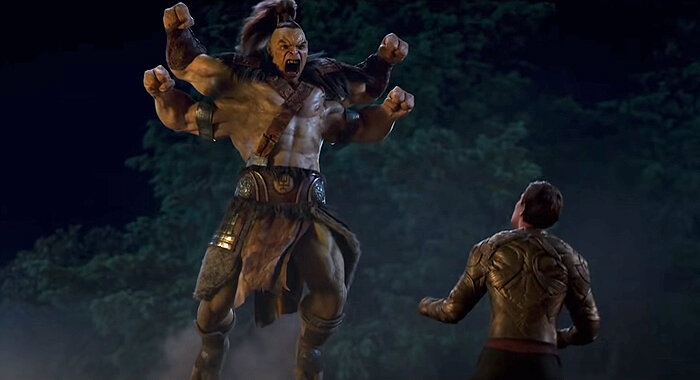Scaling Hot Takes: Mortal Kombat (2021)
As readers of this website are well aware, I am a true believer in the importance and significance of stupid bullshit that does not matter. Stupid bullshit that does not matter matters to me. It’s important. It’s sacred. It’s profound. It’s stupid bullshit. It’s kind of my thing.
So when it came time to decide what I would see first when I finally had an opportunity to see a movie in a movie theater again it was of the utmost importance that it be a movie that was not important. It mattered to me that the movie that would mark my return to movie-going did not matter in any real way.
In other words I was intent on making the Mortal Kombat reboot my big first movie back. Godzilla Vs. Kong was also in the mix because I wanted to see the giant monkey fight the atomic lizard the way God intended, on an iMax screen in a packed theater, with a large popcorn and ice cold Cherry Coke in my lap.
But April is Video Game Month here at Nathan Rabin’s Happy Place. It began with an affectionate look back at the gloriously cheesy 1995 adaptation of Mortal Kombat starring Christopher Lambert and Cary-Hiroyuki Tagawa so there’s a neat synchronicity in its ending with a new Mortal Kombat movie as well.
Mortal Kombat may not be important in the grand scheme of things or within the context of cinema history but it is an important movie to me because I was sixteen years when Mortal Kombat came out and it rocked my fucking world.
When it came to violence, Mortal Kombat went too far and then kept on going. Then again “violence” doesn’t do justice to Mortal Kombat’s intensity. Mortal Kombat didn’t just offer violence of abundant quality and quantity: it offered carnage and R-rated horror movie gore.
Mortal Kombat didn’t just aspire to wows in its video game form. It aspired to open-mouthed cries of “Oh shit!” For the sadists who created Mortal Kombat the concept of “too violent” did not exist, only “not violent enough.”
If busybodies like Joe Lieberman cracked down on video games specifically because of Mortal Kombat and, to a lesser extent, Night Trap, that’s because the game’s gleeful embrace of A Clockwork Orange-level ultra-violence practically dared grown-ups to, if not ban it outright, then at least cut down on its sociopathic bloodlust.
Sure enough the Sega and Nintendo home versions of Mortal Kombat toned down the graphic bloodshed that made the arcade version such a hit with the kiddies. And when it came time to make the leap to the big screen in 1995 director Paul W.S Anderson was constrained by a PG-13 rating that ensured his adaptation would tragically not feature dudes getting their spines ripped out or the great gushing geysers of blood like the game did.
In Mortal Kombat video games we get a good long look at the insides of fighters as well as their outsides. It’s a visceral experience in the most literal possible sense, in that we get to see plenty of viscera along with hearts, spines and all of the other wonders of the human body.
Mortal Kombat’s lack of excessive, hard-R violence created within less mature members of the moviegoing public a poignant yearning for a “real” Mortal Kombat movie that would be every bit as unhinged and over-the-top in its bloodshed as the iconic game that inspired it.
Society has evolved, or de-evolved in the ensuing years in a manner that made a “real” Mortal Kombat with all of the neck-snapping, spine-and-soul-snatching and blood-spurting we as a culture and a species crave not only possible but inevitable.
So when it came out that Mortal Kombat would be reborn as a hard-R bloodbath with all the blood, guts and excessive violence we angrily demand humanity rejoiced. The prophecy would finally be fulfilled!
Mortal Kombat is indeed violent as fuck. It earns its R rating many times over with vivisections, mutilations and angry torrents of blood spraying in every direction. Mortal Kombat has many flaws. Skimping on the gore is not one of them.
Like the transcendently cheesy 1995 hit, Mortal Kombat is about an ancient martial arts competition called Mortal Kombat that pits the anointed warriors of Earth against evil monster fighters from Outworld in an all-out battle for interplanetary control.
If Outworld defeats Earth in Mortal Kombat ten times consecutively then it gets to invade and conquer Earth. The only thing standing between Outworld’s evil schemes are a battalion of world-class warriors, many of whom have special birthmarks marking them as figures of destiny.
The Earth heroes are, alas, a bland and forgettable bunch. There’s Jaxx, for example, a US Special Forces hot shot who gets crazy robot arms after he is rudely separated from the original ones that are spontaneously upgraded into super robo-armor.
Like so much of the film, that sounds at the very least a little bit awesome but instead feels warmed over and underwhelming. Mortal Kombat desperately needs star-power yet it frustratingly did not bring back the wildly charismatic Michael Jai White, who played the role in two lower-profile earlier iterations. Instead Mehcad Brooks plays him as a boring robo-jock, an off-brand Cyborg.
If the heroes are stiffs, the bad guys are more memorable, if nowhere near as memorable as the heavies in the 1995 version. Goro, the four armed monster unforgettably given life by the great voiceover artist Kevin Michael Richardson and some talented puppeteers in Paul W.S Anderson’s Mortal Kombat is reborn lazily and disappointingly as a giant CGI monster with little in the way of screen time or personality.
Even more disastrously, Raiden and Shang Tsung, unforgettably played by scenery-chomping Christopher Lambert and Cary-Hiroyuki Tagawa respectively, are forgettably rendered with the help of unimaginative CGI.
Director Simon McQuoid doesn’t have a lot of faith in the audience’s attention span. More than once a series of fights between heroes and villains is cross-cut into a confusing, underwhelming muddle instead of being afforded time and space to breathe.
Some of the character design is inspired, particularly where villains are concerned, but it’s also the kind of movie where Josh Lawson, the actor playing laser-eyed villain Kano, is given free reign to ad-lib and improvise and mug shamelessly because his character is the only one with much in the way of humor or personality.
Mortal Kombat is pretty fucking stupid and silly but I appreciated how much of it felt like it belonged on a heavy metal album cover from the 1980s or airbrushed on the side of a van in the 1970s.
Mortal Kombat separated itself from other fighting games with its gleeful brutality but also by really leaning into fantasy, science-fiction and horror. The same is true of its newest cinematic adaptation, which also feels throughout like a particularly gory, fight-intensive X-Men movie.
The heroes are fundamentally meta-humans who must learn to harness their special powers and work together in order to defeat others with unique gifts hell-bent on destroying them.
Watching Mortal Kombat I found myself thinking about how it lacked the kind of personality and authorial stamp a real auteur might have given it and how awesome, in theory at least, a Nicolas Winding-Refn Mortal Kombat movie would be.
The deathless video game franchise plays to the Only God Forgives director’s strengths in its purposefully excessive violence and brutality, its retro stylization and testosterone-fueled excess and intensity.
In that respect video game movies are like superhero movies in that there are so many demands and expectations on them that it can be difficult, if not impossible, for a director to put an indelible stamp on the material unless they’re Uwe Boll.
Mortal Kombat closes by teasing a sequel prominently featuring one of the main characters in the video games and 1995 film: Hollywood superstar Johnny Cage, a martial artist turned movie star based on Jean-Claude Van Damme.
Like all sequel teases, this is designed to get us pumped about the possibility of more Mortal Kombat featuring a VERY familiar face from the games and original films. Yet the movie’s heroes are so bland and forgettable and Cage is such a non-entity in the 1990s movies that his inclusion in a theoretical sequel inspired a shrug of indifference rather than feverish anticipation.
If Mortal Kombat II ends up getting made, which seems entirely possible considering how much chatter I have been reading about it online, then I will undoubtedly end up seeing it and writing about it.
That’s not because I think it’ll be any good, but rather because it, like its predecessor, will give me exactly what I want from a Mortal Kombat movie, namely a bunch of cheesy nonsense from the 1990s, fatalities and brutality up the wazoo and a dude enthusiastically yelling “Mortal Kombat!” against a sick techno beat, and not an iota or crumb more.
Pre-Order The Weird A-Coloring to Al coloring book/Weird A-Coloring to Al Colored In Special Edition over at https://www.kickstarter.com/projects/weirdaccordiontoal/the-weird-a-coloring-to-al-coloring-colored-in-books
Pre-order The Joy of Trash: Nathan Rabin’s Happy Place’s Definitive Guide to the Very Worst of Everything and get access to original articles AS I write them and plenty more bonus stuff like exclusive cards featuring Felipe Sobreiro’s amazing artwork for the book at https://the-joy-of-trash.backerkit.com/hosted_preorders/cart
Help ensure a future for the Happy Place during an uncertain era AND get sweet merch by pledging to the site’s Patreon account at https://www.patreon.com/nathanrabinshappyplace









